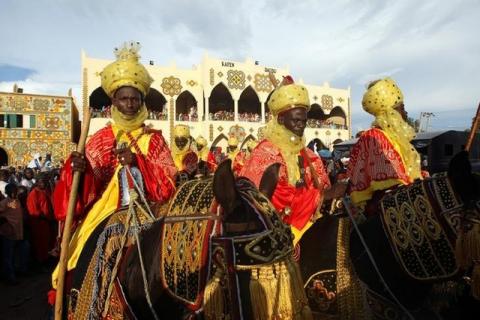Advertisement
Northern Nigerian city celebrates ancient festival as security improves
ZARIA, Nigeria (Reuters) - Riders wearing brightly colored warrior robes and bearing spears were again packing the streets of this northern Nigerian city, greeting their traditional ruler as locals celebrated a thousand-year-old tradition in a region hit by Boko Haram.
Last week the traditional ruler in Zaria city rode in a horse carriage to kick off the Durbar celebrations that mark the end of the Muslim fasting month of Ramadan.
The Durbar is a custom dating back more than 1,000 years which involves warriors from villages and towns in Nigeria's Muslim north traveling once a year to the emir's palace to renew a pledge of respect to their ruler.
But the thousands who packed the streets and minarets of mosques to watch were a far-cry from last year when many stayed indoors from fear following an attack by Boko Haram fighters that killed some 35 people in Zaria.
Now, following a military crackdown on the militant group, Alhaji Shehu Idris, Emir of Zazzau, rode to his palace.
He greeted people lining the pot-holed streets of this dusty city as he passed by, Once at the palace, he watched with officials as each area of his traditional constituency presented their turbaned chiefs and warriors in a mark of respect.
Several men -- wearing white, red, blue or yellow robes -- demonstrated their horse-riding skills on the unpaved parade ground. But some women and girls also walked during the procession.
The Nigerian military has retaken much of the territory lost to the Boko Haram jihadists. But police cars and gun-wielding police officers posted at the unpaved parade ground in front of the palace were a reminder that suicide bombs by the group remain part of life in the northern region of the oil producer.
(Reporting by Afolabi Sotunde and Ulf Laessing; Editing by Richard Balmforth)
(Reporting by Afolabi Sotunde and Ulf Laessing; Editing by Richard Balmforth)



















Add new comment